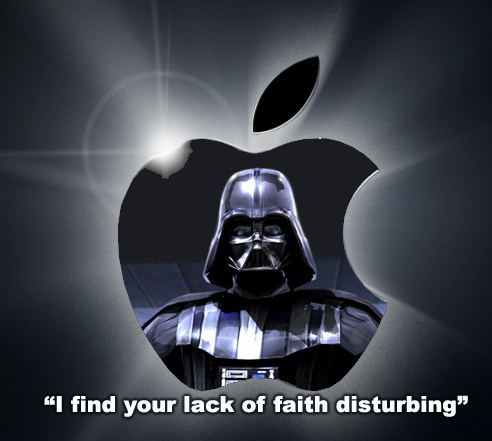Apple Inc. is named ringleader in bullying of book readers.
Apple Inc. is no longer just a monster; it’s more like the Eye of Sauron.
 US District Judge Denise Côte ruled against Apple Inc. last week, confirming that Apple, HarperCollins, Simon & Schuster, Penguin, Macmillan, and News Corp. ganged up on readers to fix e-book prices. Last year, Bad Apple settled a separate antitrust case over e-book price-fixing with the European Commission without admitting any wrongdoing. Here in America, the company maintains the role of iSavior, insisting it was just trying to break Amazon’s control of the publishing industry.
US District Judge Denise Côte ruled against Apple Inc. last week, confirming that Apple, HarperCollins, Simon & Schuster, Penguin, Macmillan, and News Corp. ganged up on readers to fix e-book prices. Last year, Bad Apple settled a separate antitrust case over e-book price-fixing with the European Commission without admitting any wrongdoing. Here in America, the company maintains the role of iSavior, insisting it was just trying to break Amazon’s control of the publishing industry.
I’ve been watching this story irregularly, as these are unhappy events.
Back in the mid-90s, Apple Inc. was a failing company, so much so that by 1996-97 it was forced to swallow its meager pride and borrow loads of money from Bill Gates and Microsoft to stay afloat. Steve Jobs got $95 million in operating capital by selling $150 million in non-voting Apple stock to Microsoft, and he sweetened the deal with Apple’s silence over allegations that Microsoft had stolen its intellectual property in building Windows.
Some Apple insiders at the time claimed Steve Jobs vowed to repay the money and buy back the stock, swearing that Apple would amputate each of the many electronic tentacles Bill Gates had slithered into his rival’s company. Some of us thought we were looking at the death of Apple, that it had succumbed to the dark side; the evil Microsoft deal was, in part, a patent cross-license. Apple’s corporate strategy had just allowed Internet Explorer to become every Mac’s default browser (as if the the Clone Wars hadn’t been bad enough.)
Back then, I knew of few bigger Apple cheerleaders than my friends and I. We didn’t care that Apple was the joke of business computing; its people were special and its fanboys unified. When you met someone known for being a “Mac guru,” first of all it was earned, and second, it was an esteemed introduction. That handshake meant something. Apple turned on that Esprit de corps when the term was made a marketing gimmick for its retail stores. Today, the authoritative influence of the term “Mac guru” is somewhere between buying men’s cologne in a Burger King parking lot and tolerating a co-worker too fragile for eye contact or heavy lifting.
 I read the judge’s ruling with sadness but zero surprise. Apple had already become a monster, but this surpasses even the antitrust antics of its old arch enemy, Microsoft. I wonder if Gates is laughing. He not only outlived Steve Jobs, he’s lived long enough to watch Apple betray the underdog ethics it was once proud of — that we were once proud of. Ouch. (Check out this Pop History Dig for some pre-“Bad” Apple history.)
I read the judge’s ruling with sadness but zero surprise. Apple had already become a monster, but this surpasses even the antitrust antics of its old arch enemy, Microsoft. I wonder if Gates is laughing. He not only outlived Steve Jobs, he’s lived long enough to watch Apple betray the underdog ethics it was once proud of — that we were once proud of. Ouch. (Check out this Pop History Dig for some pre-“Bad” Apple history.)
On the other hand, as far as corporate ships go, I guess I’ll go down with this is one. I purchased my first used Macintosh computer in 1989. With the sale came a personal tutorial, and after that I had to let the guy say goodbye to the damned thing — not because it was like some poodle he was giving away, but because he was passing along something almost as meaningful: a symbol of open-mindedness. I know that sounds all elitist and bleeding heart, or maybe it’s just nerdy, but for those too young to remember it really did feel like our exchange was part of something progressive and good. I knew to take care of the computer and pass it along with equal respect. It was like spreading the word. It was a middle finger to the establishment.
 These days, Bad Apple defines the establishment, and that makes me sad. But I have my memories and I’m still loyal. I remain a cheerleader, though I neither lead nor cheer, which really makes me an Apple Apologist.
These days, Bad Apple defines the establishment, and that makes me sad. But I have my memories and I’m still loyal. I remain a cheerleader, though I neither lead nor cheer, which really makes me an Apple Apologist.
(And now, if I might tie this post to some shameless book promotion, my second Apple product was a brand-new Apple IIGS, sitting on the desk assigned to me as a teacher’s aide in Wasco State Prison. Where Excuses Go to Die will be available on September 12, 2013 if you want to find out more.)
